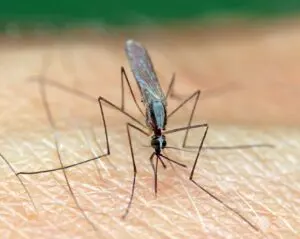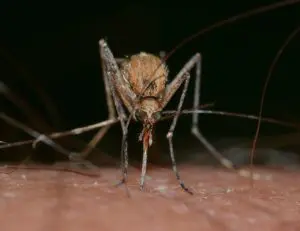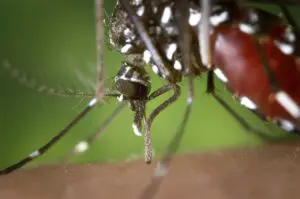
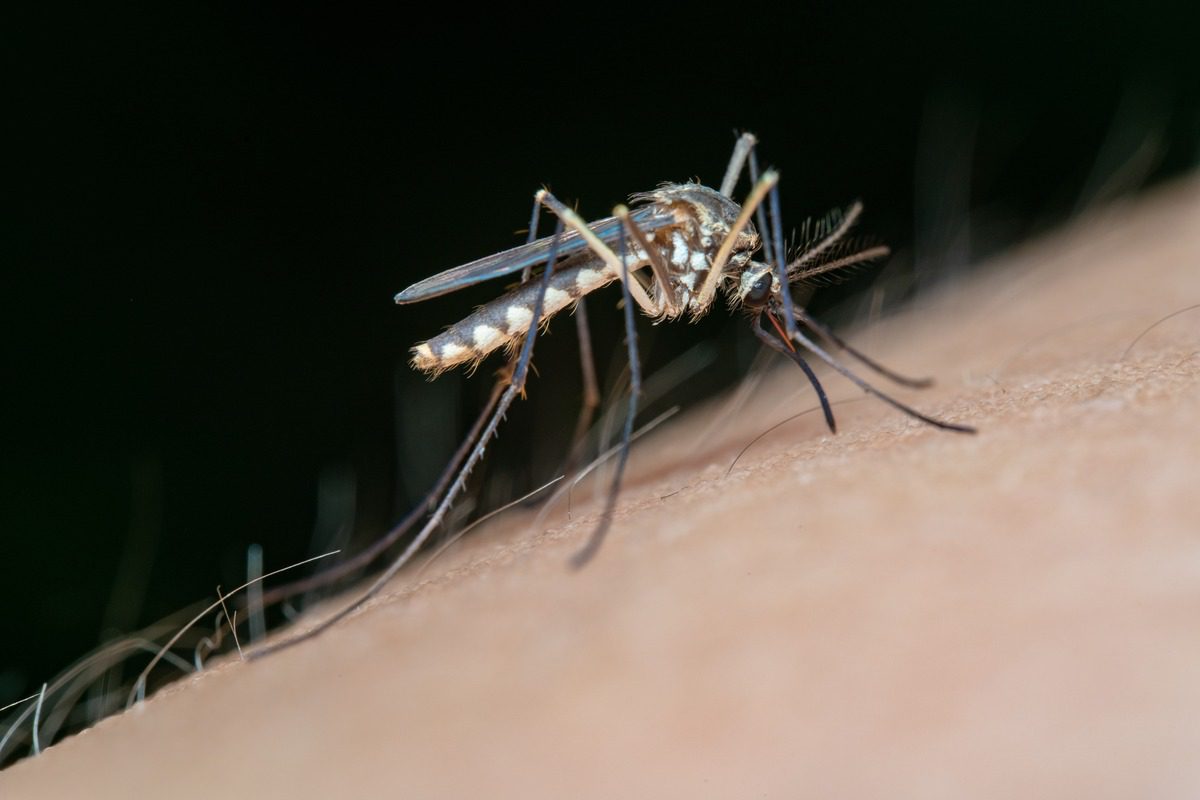
Interested in learning more about mosquitoes? Well, you can become an expert. With 30 years of expertise behind us, here is all you need to know about these buzzing pests.
Have a specific question? Jump to the answer:
What attracts mosquitoes and where can I find them?
Why are mosquitoes dangerous for humans?
Mosquito and Mosquito borne-disease statistics
Which states are most suited to mosquitoes?
Where has the most and least cases of mosquito-borne diseases?
Mosquito bite and Infestation Prevention
Why do I have a mosquito problem?
What’s the best way to prevent a tick infestation?
How do I get rid of mosquitoes?
Mosquito Basics
What is a mosquito?
Mosquitoes encompass a vast family called Culicidae, which comprises around 3,600 species of diminutive flies. Derived from Spanish, the term "mosquito" translates to "little fly." In the United States, there are approximately 176 known species of mosquitoes. These species vary in their distribution and prevalence across different regions of the country.
What do mosquitoes look like?
Mosquitoes are small insects with a distinctive appearance. They typically measure between 0.125 to 0.75 inches (3 to 19 millimeters) in length. One of their defining features is their slender and elongated body shape. Mosquitoes have one pair of wings and one pair of halteres, which are small, knob-like structures that help with balance during flight. They also possess three pairs of long, hair-like legs, which they use for various activities such as landing, gripping surfaces, and navigating their environment. Mosquitoes also have elongated mouthparts called proboscis, which they use to feed on the blood of animals, including humans. Their overall appearance can vary slightly between species, but these general characteristics are common to most mosquitoes.
What attracts mosquitoes?
Mosquitoes pick up on a variety of cues from the environment and their “victims.”
Mosquitoes are attracted to carbon dioxide emitted when you breathe as well as the odors released in your sweat. These pesky pests use their receptors and vision to zero in on these bodily cues in order to locate their next mean - and they can do this from up to 164 feet away. The buzzing beasts are also attracted to standing water and like to rest in shady spots or areas that have low air flow.
Mosquitoes also rely on visual cues to locate their potential prey and with this in mind, they tend to be more attracted to individuals wearing contrasting colors that are easily visible to them. They also find it easier to locate their next meal when there is a significant amount of exposed skin, so if your skin is exposed, you’re likely to be a mosquito's next meal.
Mosquitoes in New Jersey
Several species of mosquitoes thrive in New Jersey, often causing nuisance and health concerns to residents. The most common mosquitoes in the Garden State include the Northern House Mosquito, Eastern Salt Marsh Mosquito, and Asian Tiger Mosquito.
The Northern House Mosquito is prominent in New Jersey as it breeds in stagnant water and is found in houses with backyard containers and storm drains. They are known to transmit West Nile virus, a potentially serious illness. The Eastern Salt Marsh Mosquito, as the name suggests, breeds in coastal salt marshes and can transmit viruses like Eastern Equine Encephalitis while the Asian Tiger Mosquito, recognizable by its black and white striped pattern, thrives in urban areas in New Jersey. Efforts to control mosquito populations are crucial in New Jersey to minimize the risk of disease transmission and to enhance the quality of life for residents.
Mosquitoes in Florida
Mosquito populations thrive in Florida, with numerous species found throughout the Sunshine State. Among the most prevalent are the Aedes Aegypti (Yellow Fever Mosquito), Aedes Albopictus (Asian Tiger Mosquito), and Culex Quinquefasciatus (Southern House Mosquito). These mosquitoes flourish in Florida's warm and humid climate as they breed in standing water sources like ponds.
The mosquitoes in the area are particularly concerning due to their ability to transmit diseases such as dengue fever, Zika virus. Mosquito control efforts in Florida are crucial to minimize the risks associated with these disease-carrying pests and ensure the well-being of residents and visitors.
Why are mosquitoes dangerous for humans?
Mosquitoes pose potential risks to both humans and pets due to their ability to transmit a variety of diseases. When one of these tiny blood-sucking pests bites an infected animal or person, it can acquire pathogens such as bacteria, viruses and bacteria. Because of this, when a mosquito bites another host, it can transmit a disease-causing agent into their bloodstream, which has the potential to lead to infection or illness. Mosquitoes can transmit a variety of diseases including, but not limited to:
- Malaria: Mosquitoes can transmit the Plasmodium parasite, which causes malaria—a life-threatening disease prevalent in certain parts of the world.
- Dengue Fever: The dengue virus, transmitted by mosquitoes, can cause a flu-like illness that can progress to severe complications.
- Zika Virus: This mosquito-borne virus can lead to mild symptoms in most cases, but it poses significant risks to pregnant women as it is linked to birth defects such as microcephaly.
- West Nile Virus: Mosquitoes can transmit the West Nile virus, which can cause fever, headache, and, in severe cases, neurological complications.
Preventive measures such as using mosquito repellents, wearing protective clothing, and eliminating mosquito breeding sites can help reduce the risk of mosquito-borne diseases for both humans and pets.
Mosquito-Borne Diseases
What is Malaria?
Malaria is a potentially life-threatening disease that is caused by the plasmodium parasite. The disease is primarily passed to humans through the bite of an infected female Anopheles mosquito. Once an infected mosquito bites a person, it injects the malaria parasites into their bloodstream and when inside the body, the parasite will travel to the liver and grow, before entering the bloodstream again. Once it enters the bloodstream, the parasite will invade and destroy red blood cells. The cycle of parasite replication within red blood cells leads to the characteristic symptoms of malaria, which we will take a look at below.
Do I have Malaria?
It is important to remember that Malaria is most commonly found in tropical and subtropical regions of the world, particularly in sub-Saharan Africa, Southeast Asia, and parts of Central and South America. If you have traveled or reside in these areas, your chances of contracting Malaria will increase.
If you have been in one of these locations and have found yourself surrounded by mosquitoes then the symptoms to look out for include fever, headaches, chills, sweats, fatigue, nausea, vomiting and muscle or joint pain. In severe cases, malaria can cause complications such as organ failure, anemia, and cerebral malaria, which can result in coma or even death, especially in young children and individuals with weakened immune systems.
It is important to remember that these symptoms can be similar to a variety of other illnesses and not everyone infected with malaria will experience the same symptoms. Therefore, it is vital to seek prompt medical attention as a healthcare professional will be able to evaluate your symptoms and conduct the appropriate tests to provide you with the correct diagnosis.
What is Dengue Fever?
Dengue fever is a viral infection that is caused by the dengue virus. This is transmitted to humans via the bite of an infected Aedes mosquito, primarily Aedes aegypti. This is a common mosquito-borne disease in subtropical and tropical regions around the world.
Dengue fever can manifest in various forms, ranging from mild to severe. The symptoms typically appear 4 to 10 days after being bitten by an infected mosquito and can last for about 2 to 7 days. Below, we will take a look at the symptoms associated with Dengue Fever in greater detail.
Do I have Dengue Fever?
If you have traveled to a tropical or subtropical state or region, and have found yourself surrounded by mosquitoes it’s important to know the symptoms associated with Dengue fever.
Common symptoms of dengue fever include a high fever (as the name suggests), severe headache behind the eyes, joint and muscle aches, rash that appears 2 - 5 days after the fever, fatigue and weakness, vomiting and nausea and mild nose and gum bleeds.
In some cases, dengue fever can progress to a more severe form called dengue hemorrhagic fever or dengue shock syndrome. These severe forms can lead to greater bleeding, organ damage, and potentially life-threatening complications. It is important to seek immediate medical attention if you suspect you have dengue fever, especially if symptoms worsen or if you develop warning signs of severe dengue.
What is Zika Virus?
Zika virus is a viral infection caused by the Zika virus, which is primarily transmitted to humans through the bite of infected Aedes mosquitoes, particularly Aedes aegypti and Aedes albopictus. The virus has gained significant attention in recent years due to its association with severe birth defects, specifically microcephaly, in infants born to infected mothers. However, it is important to note that not all infants born to mothers with Zika virus infection will have birth defects.
Do I have Zika Virus?
Today as it stands, there is no current transmission of Zika virus in the continental United States. The last cases of local Zika transmission by mosquitoes in the continental United States were in Florida and Texas in 2016-17.
However, if you have recently traveled to warm, tropical climates where mosquitoes thrive and you suspect you may have come into contact with the virus, the symptoms that present include: fever, rash, joint and muscle pain, conjunctivitis (red eyes), headache and fatigue. These symptoms usually last several days or a week. In rare cases, Zika virus infection can lead to severe complications including Guillain-Barré syndrome, a neurological disorder.
If you have concerns about Zika virus or suspect you may be infected, it is important to consult with a healthcare professional who can evaluate your symptoms, provide appropriate advice, and conduct any necessary testing.
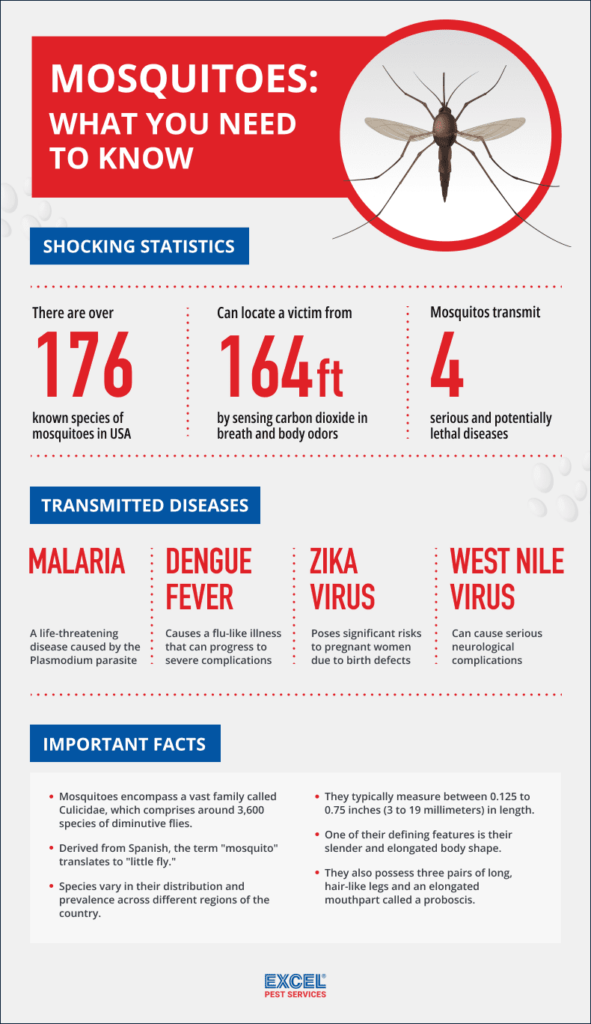
Mosquito and Mosquito borne-disease statistics
Which states are most suited to mosquitoes?
According to the most comprehensive CDC (The Centers for Disease Control and Prevention) statistics, between 2004-2016 mosquito-borne diseases were recorded in all 50 of the US states – showing that there is reason to be vigilant wherever you live.
So, in light of this, we researched the number of mosquitoes species in each state, the average temperature and rainfall and also the number of recorded incidents of mosquito-borne disease to map the threat posed by mosquitoes across the nation.
Overall, Florida is the ultimate US state for mosquitoes. Between 80-89 species of mosquitoes call the sunshine state home (only Texas rivals this huge variety of species). Florida also ranks in the top 10 for all other factors in the study, including the 4th greatest number of mosquito-borne diseases (with 3,822 listed between 2004-2016) and the rainfall and warmth providing the perfect conditions for mosquitoes to thrive.
Next up is Lousiana, which 60-69 mosquito species call home, has the 4th most rainfall, the 3rd hottest climate, and 1,145 recorded cases of mosquito-borne diseases. Rounding off the top three is Mississippi, which also provides the perfect climate for a huge variety of mosquitoes to breed and multiply.
Which US state has the most and least cases of mosquito-borne diseases?
More seriously – even if these states aren’t necessarily the most naturally appealing environments for mosquitoes – California, New York and Texas have had the most recorded cases of mosquito-borne diseases in recent decades, which includes both locally transmitted and travel-associated cases.
On the flip side, it may come as no surprise that the colder states of Alaska, Vermont and Maine have the lowest number of cases, and are also home to far fewer varieties of mosquitoes than average.
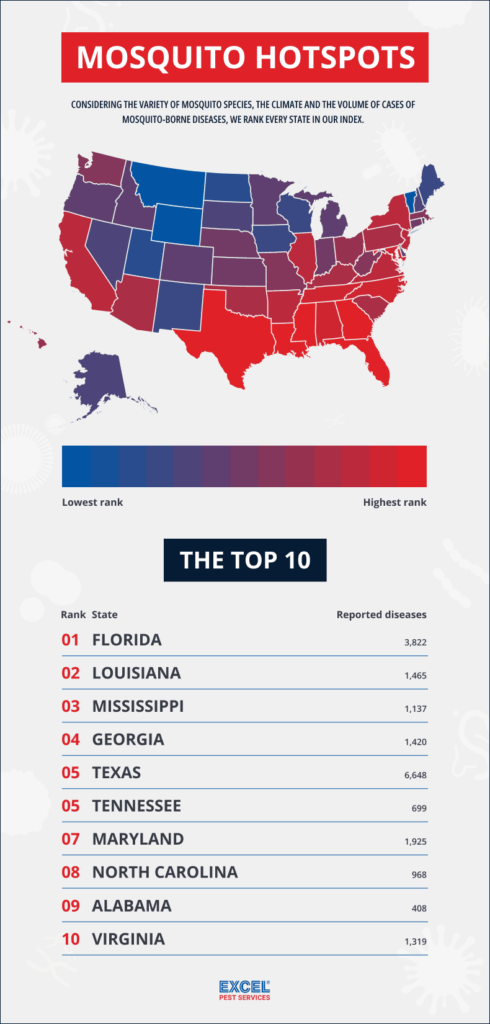
Mosquito bite and infestation prevention
How do I spot mosquitoes?
- Mosquitoes or Relatives?
Mistaking mosquitoes for other insects like crane flies and midges, particularly midges, is common. To differentiate mosquitoes from their relatives, one can observe the scaly bodies and wings, which are characteristic of mosquitoes.
- Temperature and Humidity:
Mosquitoes are highly influenced by climate conditions, making it important to consider both temperature and humidity levels when monitoring for an infestation. Being cold-blooded creatures, mosquitoes are unable to regulate their body temperature. They thrive in temperatures of 80 degrees Fahrenheit and above, while struggling to function in temperatures of 50 degrees Fahrenheit and below. Consequently, mosquitoes are generally active during the warmer months of the year and become dormant with the arrival of cooler weather.
- Active Hours:
Mosquitoes are unable to tolerate prolonged exposure to sunlight, as it leads to dehydration and their eventual demise. The cooler temperatures during the night restrict their activity, resulting in their peak hours of activity being at dawn and dusk. While mosquitoes typically rest in vegetation during the day, they may also venture out in cloudy and humid conditions. Spotting a few mosquitoes outside of their usual active hours is normal, but a significant presence during the day indicates a potential infestation.
- Consistent Buzzing:
Mosquitoes are known to produce an irritating buzzing noise that can be heard when they are close by. Occasionally hearing a mosquito is normal. However, a consistent buzzing points to a large number of mosquitoes and is therefore a definite sign of an infestation.
- Numerous Bites:
Lots of mosquito bites are a sign of a current or pending infestation for two reasons, the first being that an abundance of bites indicates an abundance of mosquitoes. But an abundance of bites also indicates mass egg production. Typically, mosquitoes rely on the nectar of plants for their nutrition and the females of most species do need to consume blood in order to lay their eggs. The more blood they consume, the more eggs they can lay.
- Egg Rafts and Floats:
Egg deposit locations vary by species, but most female mosquitoes lay their eggs in either stagnant water or small depressions that are susceptible to flooding. Mosquito eggs, which hatch within 24 to 48 hours, will typically either form a raft or a float. They look like a small piece of debris floating on the water’s surface, but closer up, it is easier to see that they are, indeed, eggs. Some species of mosquitoes lay their eggs parallel to the water’s surface and far enough apart that they don’t stick together. Sometimes these eggs will drift together and their ends will meet to form a loose mat called a float.
Buzzing near food sources:
Mosquitoes typically rely on plant nectar for nutrition so it’s normal to see them hovering around plants outside. However, seeing them hovering around plants, fruit, and other foods indoors is a sign of an infestation. When there are too many mosquitoes in one area, there may not be enough nectar to go around, which can lead some to wander indoors in search of food.
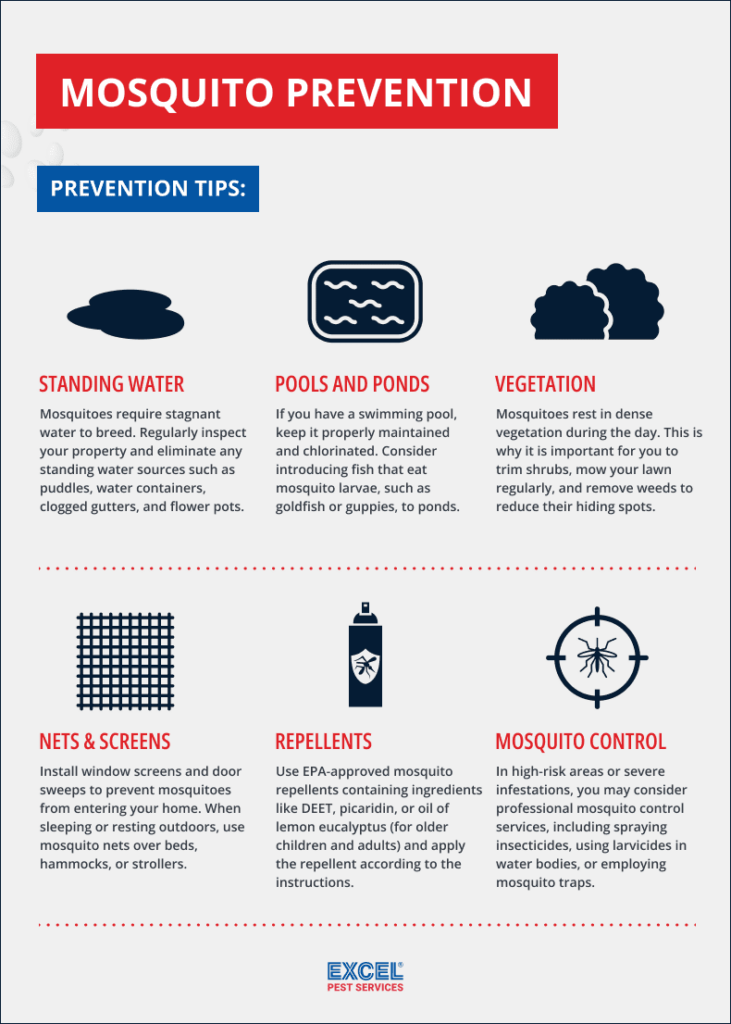
Why do I have a mosquito problem?
Are you struggling to sleep at night with a constant and annoying buzzing in your ear? Tossing and turning non stop? And waking up with itchy bites? Well, you probably have a mosquito problem. And you probably know this already. But, why is your home being targeted?
There are various factors that contribute to a mosquito problem in your area and understanding these factors can help you take appropriate actions to address the issue. Below, we take a look at some common reasons for a mosquito infestation.
- Environmental Conditions: Mosquitoes thrive in warm and humid environments, so areas with high temperatures and humidity are conducive to their breeding and proliferation.
- Standing Water: The pesky flies require stagnant water to lay their eggs and complete their life cycle. Any sources of standing water near your property, such as puddles, containers, or improperly maintained pools, can serve as breeding grounds for mosquitoes.
- Vast Vegetation and Shaded Areas: Mosquitoes seek shelter in vegetation and shaded areas during the day to avoid heat and sunlight. Properties with dense foliage, tall grass, or shrubs can provide hiding spots and resting places for mosquitoes.
- Proximity to Bodies of Water: Living near bodies of water like lakes, rivers, or wetlands can contribute to a higher mosquito population as these locations provide favorable habitats for breeding.
- Inadequate Mosquito Control Measures: Insufficient mosquito control measures, such as not using mosquito repellents, not utilizing mosquito nets, or neglecting to eliminate mosquito breeding sites, can lead to a higher mosquito population. This is why it’s important to work with a professional pest control company. They will be able to direct you on the appropriate measures to take to prevent mosquito infestations and get rid of an infestation.
What’s the best way to prevent a mosquito infestation?
Preventing a mosquito infestation requires a combination of strategies to eliminate breeding sites and protect yourself from mosquito bites.
Here are some effective ways to prevent a pesky and annoying mosquito infestation:
- Remove standing water from your property: As stated previously, Mosquitoes require stagnant water to breed. Regularly inspect your property and eliminate any standing water sources such as puddles, water containers, clogged gutters, and flower pots. Change the water in pet bowls, bird baths, and outdoor water features frequently.
- Maintain pools and ponds: If you have a swimming pool, keep it properly maintained and chlorinated. For ponds or decorative water features, consider introducing fish that eat mosquito larvae, such as goldfish or guppies.
- Maintain your vegetation: Mosquitoes rest in dense vegetation during the day. This is why it is important for you to trim shrubs, mow your lawn regularly, and remove weeds to reduce their hiding spots.
- Invest in mosquito nets and screens: Install window screens and door sweeps to prevent mosquitoes from entering your home. When sleeping or resting outdoors, use mosquito nets over beds, hammocks, or strollers.
- Apply EPA approved Mosquito repellents: Use EPA-approved mosquito repellents containing ingredients like DEET, picaridin, or oil of lemon eucalyptus (for older children and adults) and apply the repellent according to the instructions.
- Avoid peak Mosquito activity: Mosquitoes are most active during dawn and dusk. Limit your outdoor activities during these times or take extra precautions, such as applying repellents and wearing protective clothing.
- Consider Mosquito Control Measures: In high-risk areas or severe infestations, you may consider professional mosquito control services. These services can include targeted treatments, such as spraying insecticides, using larvicides in water bodies, or employing mosquito traps.
By consistently implementing these preventive measures, you can significantly reduce the likelihood of a mosquito infestation and minimize the presence of mosquitoes in your surroundings.
How do I get rid of mosquitoes?
Mosquitoes pose a significant problem across the US. While many people prefer simply not to think about the dangers associated with this tiny pest, it is important to face the problem head-on. Educate yourself on mosquitoes that are prevalent in your area. Learn how you can protect yourself against them.
If you are struggling with mosquitoes in your home or place of work, it's important that you get in contact with a licensed pest control company that specializes in mosquito control, whether for residential pest control or commercial pest control services.
If you are concerned that there is a problem in or around your home, call Excel Pest Control.




